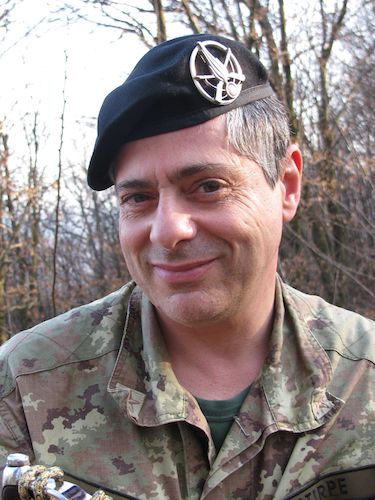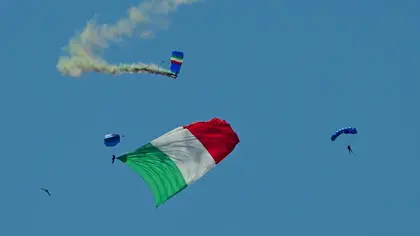The Russian invasion of Ukraine has often been described by comparing opposing sides in terms of the numbers of heavy weapons at their disposal (tanks, planes, artillery, ships etc.). However, wars are also won due to intangible factors, such as leadership and morale.
So, what are the intangible advantages that have allowed the Armed Forces of Ukraine (AFU) to push back the world’s second largest army?
Kyiv Post had the privilege of asking Colonel Orio Giorgio Stirpe, a retired Italian army officer with extensive combat experience, for his views on what has been driving the AFU’s strong performance, especially as many international military experts predicted Ukraine’s troops would be defeated in a matter of days.

Colonel Orio Giorgio Stirpe
He tells us his views, below.
“Just as the COVID-19 pandemic gave rise to an incredible number of “experts” keen to share their wisdom with the wider public – often without having medical training – the war in Ukraine has produced an even greater number of self-proclaimed experts in military matters. Most initially predicted an easy victory for Russia and its so-called ‘second most powerful army in the world.’
The Kremlin’s all-powerful armored columns were quickly blocked and later repulsed from the outskirts of major Ukrainian cities by young recruits or National Guardsmen armed with light weapons and no significant fire support. Suddenly, a cacophony of “experts” were quick to revisit their initial predictions and started counting the overall number of Russian soldiers which, numerically, were insufficient to reach the academically-agreed minimum 3-1 ratio required to achieve a military breakthrough.

We Aren't Helping Ukraine to Win
Later, those experts were counting the number of shells shot by Russian artillery against Ukrainian positions; the number of new brigades raised by Ukraine; the number of tanks available for a successful Ukrainian counter-attack; the number of men recalled into Russian service through the clumsiest mobilization ever; and the number of cruise missiles still available to the Kremlin to target civilian infrastructure in Ukraine.
Numbers, always numbers, as if they were the only possible means to evaluate a military conflict.
This tendency to analyze a war only through quantitative measurement is typical of the current mainstream way of thinking. It’s based on efficiency and an economy-based mentality that tends to underestimate the human factor.
Unsurprisingly, the large number of self-appointed “experts” still in action today tend to be largely made up of academics, enthusiastic civilians, or even military personnel who have never actually seen action outside of their own offices. The far smaller number of professionals who actually have some combat experience, on the other hand, have a privileged opportunity to look at this war through a different lens.
While reading the news, watching the images of war and listening to interviews of real actors on the struggle from both sides, we have the opportunity to put ourselves in their combat boots and try to “see” the battle as they were actually living it.
The fact is, combat is not so much about numbers, as it is about men: and not so much about the number of men involved, but about their qualities.
Motivation of Ukraine’s defenders
The first two decisive weeks of this war showed clearly to any professional soldier, either in their capacity as a professional analyst or as a veteran, one fundamental qualitative difference between the soldiers fighting on the two opposite sides: their motivation in combat.
The point is that it’s not just about how well equipped a soldier is, how well trained or led they are, how many tanks or guns they have at their disposal, nor even how many fellow soldiers there are to support. If that soldier doesn’t feel like risking their life for a cause they believe in, all the rest will be but a waste of resources.
That has been the quality difference that seems so obvious to those who not only have the knowledge, but also the experience required, to observe and analyze the conflict from outside.
It has been evident from the beginning of this war that Russian soldiers are not in the fight with their hearts and minds. Indeed, they are barely obeying orders that they don’t even fully understand. They are not there to actually risk their lives, since apart from [Russian President] Vladimir Putin’s propaganda, they are perfectly aware that their “Rodina” [motherland] is not at risk.
Ukrainian soldiers, in sharp contrast, are fully aware that their home, their family and their fundamental freedom is at stake; they have a cause to fight for, and the dearest of all at that: the sort of cause that has inspired citizens-in-arm to defend their cities from the ancient times to the World Wars.
Motivation in combat is not an easy thing to achieve. You can purchase weapons and draft people, and that’s easy to do if you have money to spend. Training and organizing troops is more difficult, but can be done with time and resources available. However, motivating soldiers to fight requires skills and background values, and no amount of money will help if those are not available.
The reason why Russian mobilization is proving so disgraceful is not so much due to a lack of resources, instructors and l equipment – it is because the personnel don’t feel motivated to take a rifle in their arms and go to face death.
There may well be hundreds of thousands of men placed in a uniform, and Russia may well manage in the end to provide them with some sort of a training and field them against Ukraine; but whatever their equipment, they will very unlikely achieve the required motivation to actually fight their foes concentrated on defending their own land.
On the other hand, Ukraine has proven good at something very important and so often badly neglected while preparing for battle. Giving your own soldiers a purpose requires leaders capable of inspiring; a chain of command capable of providing; and a society capable of offering something worth fighting for.
When the war ends and international law is restored, there will be much to study about what happened on the battlefield, and about rebuilding what has been destroyed. But perhaps the most important point the professional military will have to focus on, is the importance of creating motivation among soldiers.
Ultimately, besides the numbers of tanks and guns, and the amount of money and time invested by respective governments, the soldier is the one who decides who wins and who loses on the battlefield. And he does it with his sheer human will.
Human qualities, far more than weapons quantities, are what decide history.”
Colonel Orio G. Stirpe is a retired career officer in the Italian Army. He graduated from the Modena Army Academy in 1984 and specialized in operational planning and in military intelligence, serving in national headquarters and abroad in NATO service. During his career he saw action in Somalia (1992), Bosnia (1995), Albania (1997), Kosovo (1999),Liberia (2002) and Afghanistan (2009). During his latter service years until retirement, he served in the NATO Rapid Deployable Corps – Italy, where he created and led the Targeting Intelligence Cell of the Corps and followed closely the crisis in Libya and Ukraine. He is married and has two sons. He lives with his Norwegian wife north of the Polar Circle.
You can also highlight the text and press Ctrl + Enter






